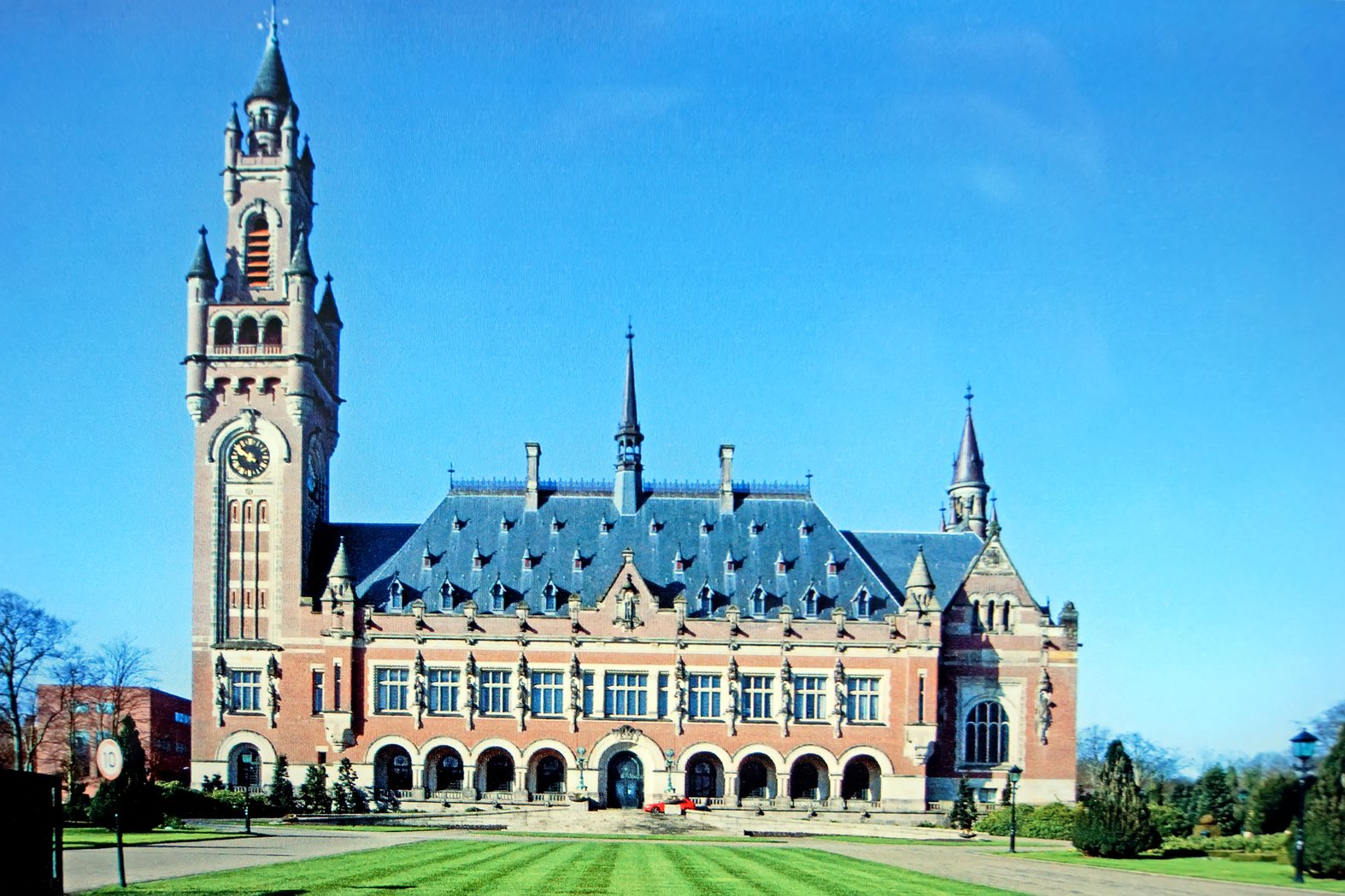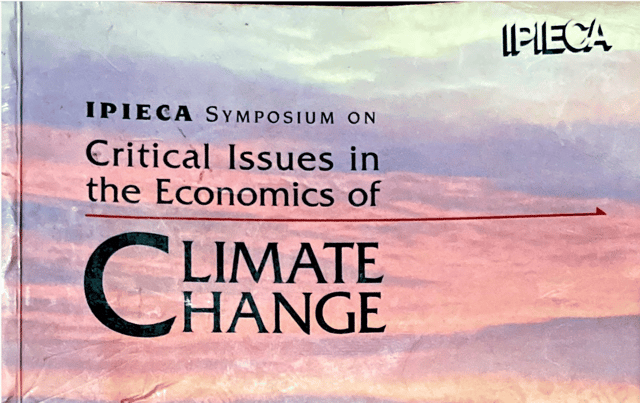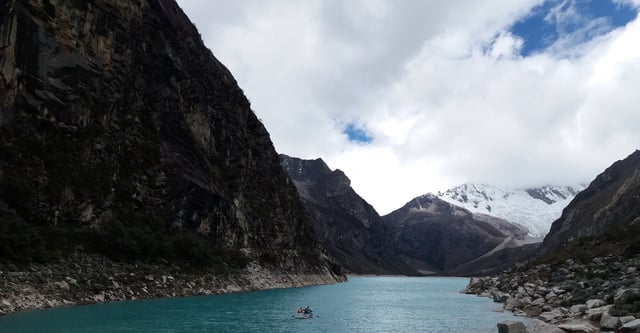
Photo of International Court of Justice by Dennis G. Jarvis, available under a Creative Commons license via Wikimedia Commons.
Nations that are particularly vulnerable to rising temperatures and sea levels are pinning their hopes on the world’s top court to set a clear path for climate justice.
A week after UN climate talks were pulled back from the brink of collapse, the International Court of Justice (ICJ) is holding an unprecedented two-week hearing exploring what obligations states have under existing rules and agreements to tackle rising greenhouse gas emissions and what happens if they fail to do so.
From 2 December, nearly 100 states will give their views on the matter, alongside a select few organizations, which the court will use to inform an official document known as an advisory opinion.
The hearing is the culmination of years of campaigning by a group of Pacific island law students. Organized under the banner of Pacific Island Students Fighting Climate Change (PISFCC), youth activists first secured the support of the government of Vanuatu, which spearheaded diplomatic negotiations.
A previous attempt to garner such an opinion by Palau and the Marshall Islands failed due to lack of political support. It wasn’t completely smooth sailing the second time round, with historically high emitters pushing back on the question of legal consequences, but the campaign was eventually successful. In March 2023, the UN General Assembly adopted by consensus a resolution recognizing the huge challenge of climate change and agreeing to seek the ICJ’s advice.
The decision was a landmark moment for climate justice. But Cristelle Pratt, secretary general of the Organisation of African, Caribbean and Pacific States, says what makes the case “truly historic” is how it has mobilized support across traditional geopolitical divides, with nations as diverse as New Zealand and Nigeria, the Bahamas and Bangladesh standing together.
A move towards the courts to try to hold governments and companies accountable for climate change has been happening for years now in response to disillusionment with political efforts. However, attempts to bring a ‘contentious’ lawsuit pitting states against each other faltered; Tuvalu threatened to pursue the US and Australia for damages in 2002 but hit big legal obstacles.
In light of growing threats to the UN process and the increasingly acrimonious debate at the annual meetings of the Conference of the Parties (COP) to the UN Framework Convention on Climate Change (UNFCCC), governments are looking to the ICJ for a more measured reflection on existing law.
Margaretha Wewerinke-Singh, associate professor of sustainability law at the University of Amsterdam and legal counsel for Vanuatu, said Vanuatu has worked hard to coordinate submissions from vulnerable countries ahead of the ICJ hearing, “ensuring alignment between as many nations as possible in these proceedings.”
Pratt said her organization too has played a “crucial role” in amplifying the voices of its member states and harmonizing their collective legal position. “We have helped ensure that the experiences and legal arguments of our countries, all from the Global South, all bearing the brunt of climate change damages, are central to this case,” she said.
With Donald Trump vowing to withdraw the United States from the Paris Agreement for the second time when he takes office in 2025 and Argentina’s Javier Milei making a similar threat, Wewerinke-Singh said it is now even more important to have a good understanding of what existing legal obligations are universal.
“There's really no difference between countries in the Pacific or in Africa or elsewhere that have suffered as a result of climate change,” Wewerinke-Singh said. “Whether we are talking about storms, about sea level rise in the Pacific or floods in Africa, in essence, this is all one thing from a legal perspective; it’s called injury and so the obligation to make full reparations applies.”
The ICJ is one of three international courts tasked with producing an advisory opinion on climate change, alongside the Inter-American Court of Human Rights (IACHR) and the International Tribunal for the Law of the Sea (ITLOS).
ITLOS was the first to complete its advisory opinion, stating earlier this year that greenhouse gases are pollutants and that states have a legal responsibility to control them that goes beyond the UNFCCC.
The IACHR held hearings into its own opinion in Barbados and Brazil earlier this year and is expected to be the next to publish.
Harj Narulla, a barrister at Doughty Street Chambers who is representing the Solomon Islands at the December ICJ hearings, said one of the ICJ’s key roles is to “harmonize and integrate” international law, so it will want to have the last word on the matter once the ITLOS and IACHR have published their opinions.
The ICJ will have to take the other two courts’ opinions into account, though. Of the two, the IACHR is considered particularly progressive. The ICJ will also consider significant court judgments from around the world, such as the European Court of Human Rights’ ruling earlier this year that Switzerland has breached the human rights of its citizens by not doing enough to cut national greenhouse gas emissions.
The court says its advisory opinions are not legally binding, but Wewerinke-Singh noted they clarify rather than create new law. And in practice it is expected to be used both in future climate lawsuits and during future international negotiations.
Experts point to an earlier advisory opinion by the ICJ, which found that the UK’s separation of the Chagos Islands from Mauritius was a breach of international law and urged the UK to return the islands. Although this didn’t happen immediately - ITLOS later issued a similar judgment and the UN voted in favor of a non-binding resolution urging it to withdraw - the UK did eventually relinquish control of the islands earlier this year.
“The court does have galvanizing force when accompanied by ongoing advocacy to induce changes in conduct,” Nikki Reisch, director of the climate and energy program at the Center for International Environmental Law, said.
And it has proved willing to uphold the law even in the face of enormous political backlash. Earlier this year, in another advisory opinion, the ICJ concluded that Israel was illegally occupying Palestinian territory.
The ICJ’s advisory opinion on climate change has attracted an unprecedented level of interest. The court received 91 written submissions—more than in any previous legal proceedings—and for many states it was their first time interacting with this institution.
A total of 98 states are due to present their arguments in The Hague, starting with Vanuatu. The US and China will be making statements too even though neither fully recognizes the court’s authority.
Written submissions have not yet been made public, but governments are expected to tussle over long-running issues including liability and compensation, migration and displacement, historic understanding of climate change and misinformation. Although governments have long had to defend their national positions at climate talks, experts say people might be surprised how “brash” these assertions are when disclosed in court and how conservative some nations’ standpoints are.
One thing that may be striking is the level of agreement about basic rules of international law, Wewerinke-Singh said. She added that there is “very little contention” that illegal conduct must cease and full reparations must be made to injured states. The debate is about how this applies to climate change and whether it should involve financial remuneration. With money the main sticking point at last week’s climate talks, states will have very different views on this.
States will definitely disagree over whether their obligations extend beyond the UNFCCC. The UN describes the Paris Agreement, which was passed in 2015, as a “legally binding international treaty on climate change” but states are free to set their own targets and policies in their nationally determined contributions.
Reisch said the U.S. in particular has always paid close attention to legal formulations and technicalities. “If its posture throughout decades of climate negotiations is any indication, we can expect it will continue to seek to deflect and undermine the bases for legal responsibility and liability.”
However, she noted that the advisory opinion will be an “authoritative interpretation of international law”, including unwritten ‘customary’ law, so will have implications for all states including the U.S.
The U.S. will only be one of dozens of states that gets to make its case at The Hague next week; each gets the same thirty minutes regardless of population or land mass.
For Phoebe Okowa, professor of public international law at Queen Mary University of London and a member of the UN’s International Law Commission, who represented a number of African states during the ITLOS and ICJ proceedings, the court will only produce a meaningful advisory opinion if it hears from the most affected and most vulnerable people. If that doesn’t happen, it risks becoming polarized like the UNFCCC process.
PISFCC campaigners worked hard to encourage vulnerable states, particularly island nations, to take part in the process and to submit strong arguments—with some success.
Based on statements made to ITLOS, Narulla expects to see some “convergence” between the arguments made by especially vulnerable states, “which are likely to be resisted by those high-emitting and wealthy nations opposing climate action.” By contrast, Okowa noted that African oil-producing countries have a markedly different view on the law.
But the process also reveals a huge disparity in access to scientific, economic and legal evidence and skills. Speaking during a recent webinar on climate litigation, Okowa said this means wealthy industrialized states and fossil fuel producers can better “articulate and put forward their case.” Some states did not even send their written submissions to the court in time.
Whether the ICJ recognizes this disparity remains to be seen, but it has expressed a preference for states to be represented by their own people rather than experts flown in from abroad.
The court will hear some statements presented not just by lawyers and politicians but in some cases by ordinary people at the frontlines of climate change. “There’s a lot of thought going into how to leverage the opportunity of an oral argument to really be somewhat creative, to tell powerful narratives,” Reisch said.
According to Reisch, the upcoming hearings may prove more consequential for climate action and justice than COP29. “The court’s opinion could provide an antidote to political inertia. Clarifying states’ legal obligations doesn’t depend on negotiated outcomes that can be diluted, obstructed, or reduced to a lowest common denominator, as they have been so often over three decades of UN climate talks,” she said.
Vishal Prasad, campaign director of PISFCC, says high-polluting countries have tried to derail previous advisory opinion processes. “At the oral hearings, we anticipate the same,” Prasad said. “But our hope and our expectation is that these countries do not and then they come forward in support, in solidarity… with Global South countries.”
The ICJ is expected to publish its advisory opinion some time after summer 2025. When it does, Arnold Kiel Loughman, attorney-general for Vanuatu, said he hopes it will “usher in a new era of climate cooperation.”


